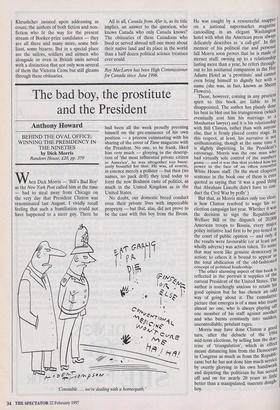The bad boy, the prostitute and the President
Anthony Howard
BEHIND THE OVAL OFFICE: WINNING THE PRESIDENCY IN THE NINETIES by Dick Morris Random House, £20, pp. 359 Wen Dick Morris —.Till's Bad Boy' as the New York Post called him at the time — had to steal away from Chicago on the very day that President Clinton was renominated last August, I vividly recall feeling that such a humiliation could not have happened to a nicer guy. There he had been all the week proudly preening himself on the pre-eminence of his own position — a process culminating with his sharing of the cover of Time magazine with the President. No one, to be frank, liked him very much — glorying in the descrip- tion of 'the most influential private citizen in America', he was altogether too buoy-
antly boastful for that. He was, of course, in essence merely a pollster — but then (no names, no pack drill) they tend today to form the new Brahmin caste of politics, as much in the United Kingdom as in the United States.
No doubt, our domestic breed conduct even their private lives with impeccable propriety — but that, alas, did not prove to be the case with this boy from the Bronx. He was caught by a resourceful snapper on a national supermarket magazine canoodling in an elegant Washington hotel with what the American press always delicately describes as 'a call-girl'. In this memoir of his political rise and personal fall Morris soon proves that he is made of sterner stuff: owning up to a relationship lasting more than a year, he refers through- out to his nocturnal companion in the Hay Adams Hotel as 'a prostitute' and cannot even bring himself to dignify her with a name (she was, in fact, known as Sherry Flowers). Those, however, coming in any prurient spirit to this book are liable to be disappointed. The author has plainly done his best to blot out his transgression (which eventually cost him his marriage to a Manhattan lawyer) and it is his relationship with Bill Clinton, rather than with anyone else, that is firmly placed centre stage. In this respect, at least, his narrative is not unilluminating, though at the same time it is slightly dispiriting. In the President's entourage, Morris was the one man who had virtually sole control of the numbers game — and it was this that yielded him his power in the face of an often resentful White House staff. (In the most eloquent sentence in the book one of them is even quoted as saying that 'it was a good thing that Abraham Lincoln didn't have to con- duct the Civil War by polls'.) But that, as Morris makes only too clear, is how Clinton resolved to wage his re- election campaign last year. Whether it was the decision to sign the Republicans, Welfare Bill or the dispatch of 20,000 American troops to Bosnia, every major policy initiative had first to be pre-tested in the court of public opinion — and only d the results were favourable (or at least not wholly adverse) was action taken. To some that may seem like genuine democracy in action; to others it is bound to appear as, the total abdication of the old-fashioned concept of political leadership.
The other alarming aspect of this book is reflected in the portrait it supplies of the current President of the United States. The
author is touchingly anxious to retain his good opinion but he has chosen an odd way of going about it. The cumulative picture that emerges is of a man who trusts almost no one, who is always playing off one member of his staff against another and who bursts constantly into sudden, uncontrollable, petulant rages. Morris may have done Clinton a go°d, turn, after the debacle of the 199' mid-term elections, by selling him the doc- trine of 'triangulation', which in effect meant distancing him from the Democrats in Congress as much as from the Republi- cans; but he has not done him much service by overtly glorying in his own handiwork and depicting the politician he has served off and on for nearly 20 years as little better than a manipulated, insecure dough- boy.


























































 Previous page
Previous page